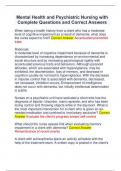Mental Health and Psychiatric Nursing with
Complete Questions and Correct Answers
When taking a health history from a client who has a moderate
level of cognitive impairment as a result of dementia, what does
the nurse expect to find? Correct Answer Accentuated premorbid
traits
Rationale:
A moderate level of cognitive impairment because of dementia is
characterized by increasing dependence on environmental and
social structure and by increasing psychological rigidity with
accentuated previous traits and behaviors. Although paranoid
attitudes, which are associated with hypervigilance, may be
exhibited, the disorientation, loss of memory, and decrease in
cognition usually do not lead to hypervigilance. With the decrease
in impulse control that is associated with dementia, decreased,
not increased, inhibition occurs. Enhancement of intelligence
does not occur with dementia, but initially intellectual deterioration
is subtle.
Nurses on a psychiatric unit have secluded a client who has the
diagnosis of bipolar I disorder, manic episode, and who has been
losing control and throwing objects while in the dayroom. What is
the most important intervention for a client who is given an as-
needed medication and confined to involuntary seclusion? Correct
Answer Evaluate the client's progress toward self-control
What should the nurse assess first when evaluating memory
impairment in a client with dementia? Correct Answer
Remembrance of recent events
A client with schizophrenia plans an activity schedule with the
help of the treatment team. A written copy is posted in the client's
,room. What should the nurse say when it is time for the client to
go for a walk? Correct Answer "It's time for you to go for a walk
now."
They combat the extrapyramidal side effects of the neuroleptic
drug. Correct Answer A nurse is administering medications to
clients on a psychiatric unit. What does the nurse identify as the
reason that so many psychiatric clients are given the drug
benztropine or trihexyphenidyl in conjunction with the
phenothiazine-derivative neuroleptic medications?
Torticollis Correct Answer acute dystonia that involves muscle
spasms of the neck; develops within 1 to 5 days after beginning
therapy with a conventional antipsychotic
Tardive dyskinesia Correct Answer involuntary repetitious tonic
muscular spasms that involve the face, tongue, lips, limbs, and
trunk; takes several months to years to develop after the start of
therapy with a conventional antipsychotic
d/c if observed, may be reversible
Pseudoparkinsonism Correct Answer extrapyramidal tract
response that includes masklike facies, shuffling gait, pill-rolling
tremors, stooped posture, and drooling; develops within several
days to 1 month after the start of therapy with a conventional
antipsychotic
Neuroleptic malignant syndrome Correct Answer severe,
potentially fatal response to conventional antipsychotics
caused by acute reduction in dopamine activity, precipitating
hyperthermia/pyrexia, tachycardia, tachypnea, unstable blood
pressure, dyskinesia, incontinence, decreased level of
consciousness
,Clozapine Correct Answer 2nd gen atypical antipsychotic drug
that is more effective than other second-generation antipsychotics
Seizures, sedation, and akathisia are common side effects
contraindicated in clients with bone marrow depression
may cause agranulocytosis, the client's white blood cell (WBC)
count should be monitored weekly. The drug should be
discontinued if the count falls below 3,000/mm 3
use with caution in clients with seizures
Isocarboxazid Correct Answer MAOI
Circulatory collapse is associated with toxicity
fluphenazine Correct Answer typical antipsychotic
Acute dystonic reactions such as tremors, dyskinesia, and
akathisia are observable side effects
decreased salivating
haloperidol Correct Answer antipsychotic drug used in the long-
term treatment of psychosis
Gynecomastia is one of the adverse effects of this drug
Potential adverse effects: pseudoparkinsonism and urinary
retention related to extrapyramidal syndrome
Ziprasidone Correct Answer atypical antipsychotic
contraindicated in clients with a history of dysrhythmias
, Akathisia Correct Answer Motor restlessness
can be treated with an antiparkinsonian or anticholinergic drug
while the antipsychotic medication is continued
acute dystonia Correct Answer Acute, often painful, sustained
contraction of muscles
typically occurs 2 to 5 days after the introduction of antipsychotic
medications
can be treated with an antiparkinsonian or anticholinergic drug
while the antipsychotic medication is continued
Disulfiram Correct Answer aversion therapy for alcohol
addiction/abuse
cannot tolerate alcohol when on it
consuming alcohol while taking it will cause a severe reaction:
nausea, vomiting, hypotension, headache, tachycardia,
tachypnea, and flushing
Duloxetine Correct Answer used to treat both generalized anxiety
disorder and depression
can worsen uncontrolled angle-closure glaucoma
Lithium Correct Answer used to treat manic episodes but is
contraindicated in clients with renal or cardiovascular disease
therapeutic range of serum levels is 0.5 to 1.5




